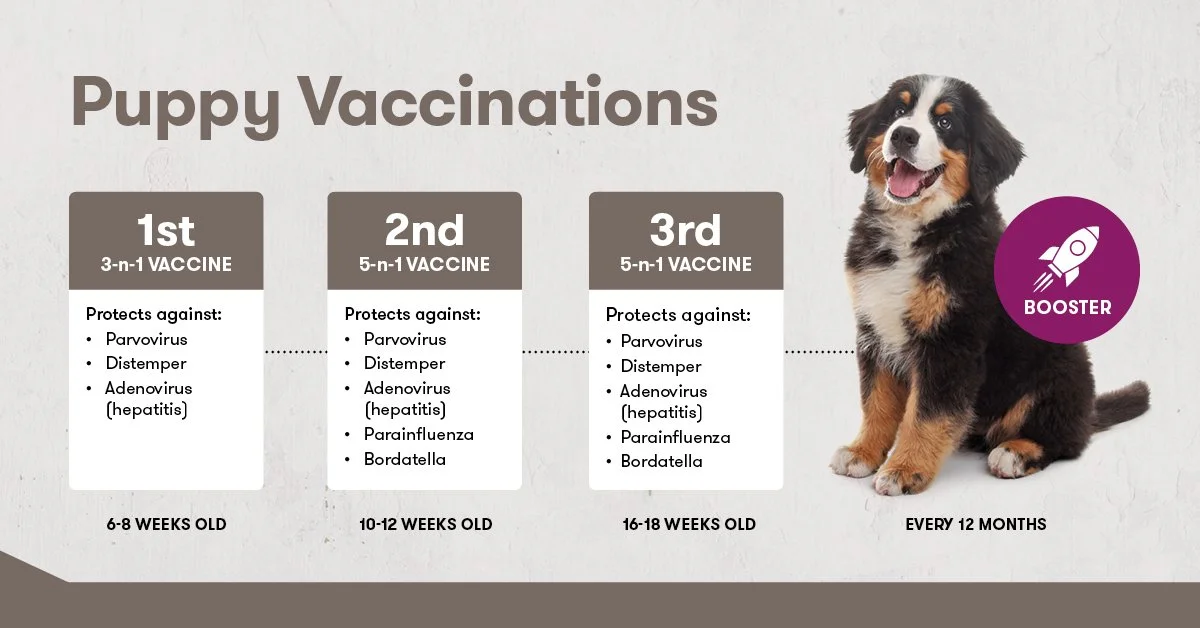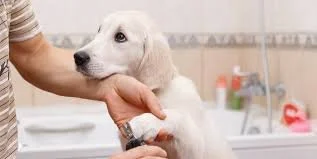Preparing For Your New Puppy
How exciting! You've chosen your new puppy, and maybe they're even in your loving arms already. Aside from all the vet visits, training, and tearing up anything they get ahold of, the puppy stage is my absolute favorite. The cuddles, dependency and hilarious "oopsies" of a clumsy puppy make for the best first year!
In this blog I will go over everything you need to know in the first year of having a puppy, from proofing your home to Veterinary care and budgeting. Let's get into it!
Proofing your Home
This step is vital to keep your sanity and your puppy out of harm's way. In general - make your house toddler proof! Use crate training or put up an indoor gated area for them to play or rest without supervision. Here are the most common hazards that we've seen or heard of, from a veterinary medicine point of view.
Stairs: Depending on the size and age of your puppy, stairs can be a hazard the first several weeks. Make sure to block off any steps until they've adapted to using them while under direct supervision.
Cords: Chewing through a power cord could lead to electrocution, which can cause painful mouth burns and ulceration; luckily most burns can be treated with pain management. Non-Cardiogenic Pulmonary Edema might also occur from the electricity. NCPD is inflammation of the lung tissue making it hard for them to transfer fresh oxygen into the circulating blood. The only treatment for this is oxygen supplementation, time, supportive care and, depending on the severity, treatments for secondary diseases like pneumonia.
Small toys, clothing, etc.: These present choking hazard of course, along with possibilities of a GI upset and/or a foreign body, which can require surgical removal if it obstructs the bowels. As well, your child might not be happiest if they lose a toy or sock!!
Chemicals/Cleaning Supplies: Keep these out of reach!! You may need to get child door locks to prevent your puppy from getting into these harsh chemicals. If digested, many chemicals can cause ulcerations, chemical burns, major GI upset, clotting or neurologic disorders. Rat bait is a very commonly ingested toxin to dogs and cats - I won't even allow this on my property honestly. Sticky traps, humane cage traps, and other devices will be much safer for your pet if they happen to get into them.
Vet Visits
This topic was requested by so many people, I was shocked!! (And truthfully, I'm even more shocked with how few Veterinary Clinics actually spell out their vaccine protocols, deworming, surgical options, and any the other info that owners need to know.)
So here is a general run down on what your dog needs in their first year.
*Each Veterinarian has their preferred timeline, drug companies, food brands and more, so depending on which they prefer, this information can change!*
Vaccines:
It is best to keep your puppy away from unknown dogs, dog parks, parks, boarding facilities and grooming facilities until they are fully vaccinated. We see way too many sick puppies because owners don't think these diseases are a common problem or that the disease even exists. Unfortunately most of these are fatal without immediate treatment and having at least some immunity to whichever disease.
Rabies: 1 shot, lasts for 1 year. Needs a booster shot after that 1 year, Moving forward, some vaccine brands last 3-5 years after their 2nd or 3rd shot. Your puppy has to be at least 12 weeks old to receive this vaccine!
Distemper: A lot of Veterinary staff call this combo vaccine only by distemper. Most combo vaccines for dogs include Distemper Virus, Canine Adenovirus Type 2, Canine Parainfluenza Virus, Parvovirus, Coronavirus (THIS IS NOT COVID-19) and +/- Leptospirosis. Your puppy needs at least 3 boosters, anywhere from 2-4 weeks apart and most brands are approved to administer at 8 weeks of age.
Kennel Cough: Your veterinarian will choose either an intranasal, SQ injection or oral type, and your dog will need a booster every 6 months. This isn't always a necessary vaccine unless your dog gets boarded, groomed, goes to daycare or goes to crowded dog parks.
K9 Influenza: this is a newer vaccine due to a new strain of k9 influenza running rampid through the U.S. Last I knew your pet needed the initial injection, then 1 booster 3 weeks after the initial injection and they should be good to go for 1 year. This is a newer vaccine and disease, so this information could be outdated.
Refer to my "All Things Parasites" blog in regards to deworming and preventative medications for fleas, ticks, heartworms and more!
Spay & Neutering
Please spay or neuter your puppy. I know, you're tired of hearing this from your Vet and seeing it everywhere else. However, it's valid, and here's the reason medical professionals keep repeating this: Delaying a spay or neuter can lead to numerous behavior issues and health related issues, such as mammary cancer or prostate cancer. Gas anesthetics are approved for use on puppies 8 weeks and older. My personal opinion is to spay or neuter between 3 months to 5 months old, depending on the size of your puppy.
Myth Busting: Your hunting dog will still have and develop their instincts, performing top notch if trained correctly... You're not taking away his manhood. The younger the dog, the faster recovery they have from surgery..
You want to breed her? With what? Why? Do you have any clue what you're doing? Have you researched the cost of AI-ing your dog, or the cost of a stud fee, or-? Are you willing to take responsibility to work with a Veterinarian to learn everything you need to learn? Just one litter because puppies are cute, or your best friend's sister-in-law sells a specialty mixed breed for $4,000 per puppy?
PLEASE NO.
I got Ollie neutered at 11ish weeks and he did great! And he's still a VERY large, instinctual and masculine dog.
On the contrary… there are new studies showing that NEUTERING your male golden retriever at 2 years old could possibly decrease the chances of orthopedic cancers later in life… to sum up the study for you; it’s not a drastic result, and they are still conducting more studies to make sure this is truly factual. Genetics & lifestyle still play a significant role in your pets’ geriatric health.
At-Home Handling & Care
Nail trimming: Ask your vet to show or teach you how to trim your dog's or cat's nails, or look up a few YouTube videos. While they're young, create the habit of messing with their feet and nails when you're cuddling, playing, etc.. Doing so will desensitize them from becoming anxious or fearful when you or the Vet touches their paws.
Teeth Brushing: Start right away, using a pet-approved toothbrush and toothpaste.
When they have puppy teeth, this isn’t super vital to their oral health, however it does desensitize them to getting their teeth brushed.
Ear Cleaning: Depending on the breed you have, you may not have to clean their ears too often, but getting them used to the sensation and sitting still for the cleaning process will be a life changer - this goes for kittens as well!
Brushing their Coat: whether you have a shedding breed or not, brushing is a must! There are tons of brushes out there for different coat types so do a little research and get what's best for your dog! If you have a shedding breed, typically they don't start shedding too badly until they're over 6 months of age but getting them used to the brush at a young age will make the process quicker and it can become a fun activity for both of you!
Budgeting The 1st Year
The last thing you want to think about is actually the most important thing to think about before bringing home your new pet...How much is this puppy going to cost me?! Well... hundreds if not thousands of dollars, if you're not careful or smart about it.
If you have a lower budget, I recommend getting a puppy from a Humane Society or Rescue. They will have received their first round of shots (if not all of their shots), a few doses of dewormer and will most likely be spayed/neutered! That right there is saving you ~$350 plus! Although you will have a $60-$120 adoption fee, it is so worth it, and you just saved a life!
After purchasing your puppy, the 3-4 vet visits for the first year will cost you anywhere from $50-$150 per appointment. Of course this depends on what your pup needs, their size, age, and the Clinic. Plan on the alteration (spay/neuter) procedure to cost anywhere from $150-$400 depending on the clinic, age, weight and sex of your pet. If you have a deep-chested breed which is prone to GDVs (Gastric Dilation & Volvulus), now would be the time to get your dog's stomach "Tacked" aka sutured to the side wall of the abdomen. It's a non-invasive procedure that will only add a minimal amount of money onto the alteration procedure. (If you don't take this preventative step now, keep in mind that a common emergency surgery and recovery for GDV can run a minimum of $2,500 upwards to $10,000 depending on the severity of the case.)
If you have a new puppy and have more questions, do not hesitate asking your Veterinarian or the Registered/Licensed Veterinary Nurse! Most clinics have pamphlets with all of this info plus more, which they will give you during your first Vet Visit!
(I will note, if the clinic doesn't provide you with these things, I recommend finding a new clinic.)
If you're in the Holdrege, Nebraska area, North Park Animal Hospital and Holdrege Vet Clinic are both wonderful options with little price difference!


